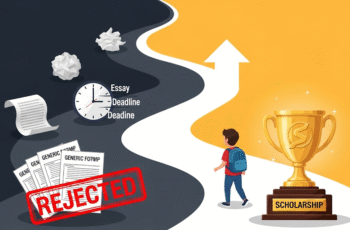The path of a creative writer is one of passion, dedication, and an unyielding commitment to the power of words. From the bustling streets of Lagos to quiet corners of the world, writers are driven by a need to tell stories, to capture the human experience, and to build worlds with nothing more than language. But while the words may be free to flow, the path to a professional writing career is often fraught with financial challenges. Tuition for a master’s degree in creative writing, fees for writing workshops, and the simple need for time to write can seem insurmountable.
But for every aspiring author with a powerful story to tell, there is an opportunity. A growing number of universities, literary foundations, and organizations are investing in the next generation of writers, providing scholarships that allow them to hone their craft without financial worry. These are not just writing contests with small cash prizes; they are substantial awards designed to support your education and give you the time and resources you need to create your best work.
This comprehensive guide is your key to unlocking creative writing scholarships. We will show you why these awards are so vital for the literary world, where to find them, and how to craft an application that makes your voice heard above the rest.
Why Creative Writing Scholarships are Essential
Creative writing scholarships are more than a financial boost; they are a profound investment in the future of literature and a powerful endorsement of your artistic potential.
- Fueling Artistic Dreams: For many talented writers, scholarships are the only way to pursue a formal education in creative writing. They provide the financial freedom to attend a top-tier university, participate in an intensive workshop, or simply have the time to write, freeing them from the distraction of financial worries. This is particularly crucial for aspiring writers in Nigeria who may not have access to the same resources as their international peers.
- Supporting Diverse Voices: A rich literary world is one that is filled with diverse perspectives. Creative writing scholarships actively seek to support writers from underrepresented backgrounds, ensuring that a wider range of stories—from different cultures, genders, and experiences—are told and celebrated. For a country as culturally rich as Nigeria, this is essential for bringing local narratives to a global stage.
- Investing in the Future of Literature: By funding the education and development of young writers, these scholarships are investing in the future of poetry, fiction, drama, and non-fiction. They are providing the next generation of African authors with the tools they need to craft award-winning books, publish in prestigious journals, and build a lasting legacy.
- Recognizing and Rewarding Talent: Winning a creative writing scholarship is a validation of your talent. It is a signal from a panel of experienced judges and professionals that they believe in your unique voice and your potential as a writer. This recognition can be a powerful motivator, fueling your confidence and commitment to your craft.
Exploring the Landscape of Creative Writing Scholarships
The scholarship landscape for creative writing is as diverse as the genres themselves. Knowing where to look will help you find the awards that are a perfect fit for your work.
1. University-Based Scholarships
Many universities with strong creative writing programs offer dedicated scholarships to attract top talent. These can range from partial tuition waivers to full-tuition scholarships for their MFA or MA programs. Often, your writing sample and application for admission will double as your scholarship application, so a strong portfolio is key.
2. Literary Organizations and Foundations
This is a rich source of funding for aspiring and established writers.
- The Miles Morland Foundation: This is a particularly important scholarship for African writers. The Morland Writing Scholarships are open to any writer born in Africa, or both of whose parents were born in Africa. They provide a generous grant of £18,000, paid monthly over the course of a year, to allow writers to focus on writing a full-length work of fiction or non-fiction. The application requires a published writing sample and a proposal for a new book.
- The Caine Prize for African Writing: While primarily an award for a short story, the Caine Prize also hosts fully funded writers’ workshops and retreats for its shortlisted authors and other emerging writers. This provides an invaluable opportunity for mentorship and networking.
- The Association of Nigerian Authors (ANA): While the ANA primarily sponsors literary prizes for published works, it also works to secure grants to support literary awareness campaigns and workshops. They may be able to provide information on grants or competitions available to their members.
- International Organizations: Organizations like the PEN America and National Endowment for the Arts (NEA) in the US offer various grants and fellowships for writers, some of which are open to international applicants.
3. Writing Workshops and Retreat Scholarships
Workshops and retreats can be transformative for a writer, providing uninterrupted time to write and feedback from established authors. Many of these programs offer scholarships or grants to make them accessible to writers from all backgrounds. The Lagos Studies Association, for example, hosts a writing workshop for Nigeria-based scholars, providing hotel accommodation, meals, and a supportive environment for authors to complete manuscripts. While not an ongoing scholarship, these can be a crucial stepping stone.
4. Genre-Specific Scholarships
Many scholarships are tailored to a specific genre, allowing you to showcase your expertise.
- Poetry: Awards for poets often require a portfolio of work and may be tied to a university’s MFA program in poetry.
- Fiction: These scholarships can be for short story writers or novelists, often requiring a writing sample and a compelling book proposal.
- Screenwriting and Playwriting: For aspiring writers for the stage or screen, awards may be offered by theater companies or film institutes and often require a full script or a portfolio of work.
Finding Your Creative Writing Scholarship (with a Nigeria Focus)
A strategic search is key to finding the right opportunity. Here’s how to begin your hunt for a creative writing scholarship.
- Research University Creative Writing Programs in Nigeria: Check the websites of universities like the University of Lagos or the University of Ibadan. Their literature and arts departments may have information on program-specific scholarships for creative writers.
- Explore Nigerian Literary Organizations: The Association of Nigerian Authors (ANA) is a great starting point. Follow their news and events for announcements about grants, workshops, or prizes. Also, keep an eye on literary magazines and journals in Nigeria, as they may announce related opportunities.
- Look for International Scholarships Open to Nigerian Writers: This is a crucial step. Many international foundations and universities have a specific focus on supporting African writers. Search for phrases like “creative writing scholarships for African writers,” “international writing residencies for African writers,” or “Commonwealth Writers” to find awards that are specifically for you.
- Online Scholarship Databases: Use major scholarship search engines and filter your search by “creative writing.” While many of these are for a general international audience, they can still lead you to awards that are open to Nigerian students.
Crafting a Winning Creative Writing Scholarship Application
Your application is a chance to prove that you have the talent, dedication, and unique voice that a scholarship committee is looking for. A great application will combine your best work with a compelling narrative about your journey.
The Writing Sample
This is the most important part of your application. You are a writer, so let your words do the talking.
- Submit Your Best Work: Choose a writing sample that is polished, powerful, and showcases your strengths. Make sure it adheres to all word count and formatting requirements.
- Tailor Your Sample: If the scholarship is for a specific genre, make sure your sample is in that genre. If it is for a specific theme, try to submit something that aligns with it.
The Personal Statement: Your Journey as a Writer
Your personal statement should be a piece of creative writing in itself.
- Articulate Your “Why”: Why do you write? Talk about a specific moment or an experience in your life that made you realize your calling. It could be about growing up listening to folk tales in Nigeria, or a moment of political upheaval that made you want to write for change.
- Connect to the Future: Explain how this scholarship will help you achieve your goals. Don’t just say you need the money. Say that the scholarship will give you the time to finish the novel you are working on about the history of Lagos, or that it will allow you to attend a workshop with a writer you admire.
Letters of Recommendation
- Choose the Right Recommenders: Ask teachers, writing mentors, or professionals who have read your work and can speak to your talent and potential. A letter from a professor in Nigeria who knows your dedication is more valuable than a generic letter from a family friend.
Featured Scholarship Examples for Aspiring Writers
To give you an idea of the types of awards available, here are some representative examples. (These are fictional examples; always research current scholarships and their providers.)
- The Femi Osofisan Playwriting Scholarship: This scholarship, named after a famous Nigerian playwright, is for young Nigerian playwrights with an interest in social and political commentary. The award covers tuition for a master’s degree in dramatic arts at a Nigerian university and includes a mentorship with a professional playwright.
- The Chinua Achebe Fiction Award: A prestigious international foundation offers this award to African novelists who are working on their first or second book. The award provides a generous stipend for one year, allowing the writer to focus on their work.
- The Lagos Poet Laureate Fellowship: A local arts council in Lagos offers this fellowship to a resident poet. The award includes a monthly stipend for a year and a residency at a local cultural center, with the expectation that the poet will lead community workshops.
- The African Voices Scholarship: This award is for writers from any country in Africa who are writing in English. It provides a grant to cover the costs of a writing workshop or retreat, either in Africa or abroad.
Beyond the Scholarship: Nurturing Your Writing Career
Winning a scholarship is a huge accomplishment, but it’s just the first chapter of your writing career. To thrive, you need to continue to hone your craft and build your community.
- Join Writing Communities and Workshops: Connect with other writers in Lagos and throughout Nigeria. Join online writing groups and seek out workshops where you can get constructive feedback. The support of a community can be invaluable.
- Seek Publication Opportunities: Explore literary magazines, journals, and publishers in Nigeria and internationally. A publication in a respected journal can open doors to more opportunities and grants.
- Build Your Author Platform: In today’s digital world, an author’s platform is essential. Create a website, start a blog, or engage with readers on social media. This helps you build a following and connect with your audience.
Your Future is Waiting
Your words are a powerful force, and your stories deserve to be heard. The financial barriers that once seemed insurmountable are being broken down by a new generation of creative writing scholarships. By being proactive in your search, authentic in your application, and persistent in your efforts, you can secure the funding you need to pursue your education and take your place in the global literary landscape. Your words are a currency, and your stories are a treasure waiting to be shared.

